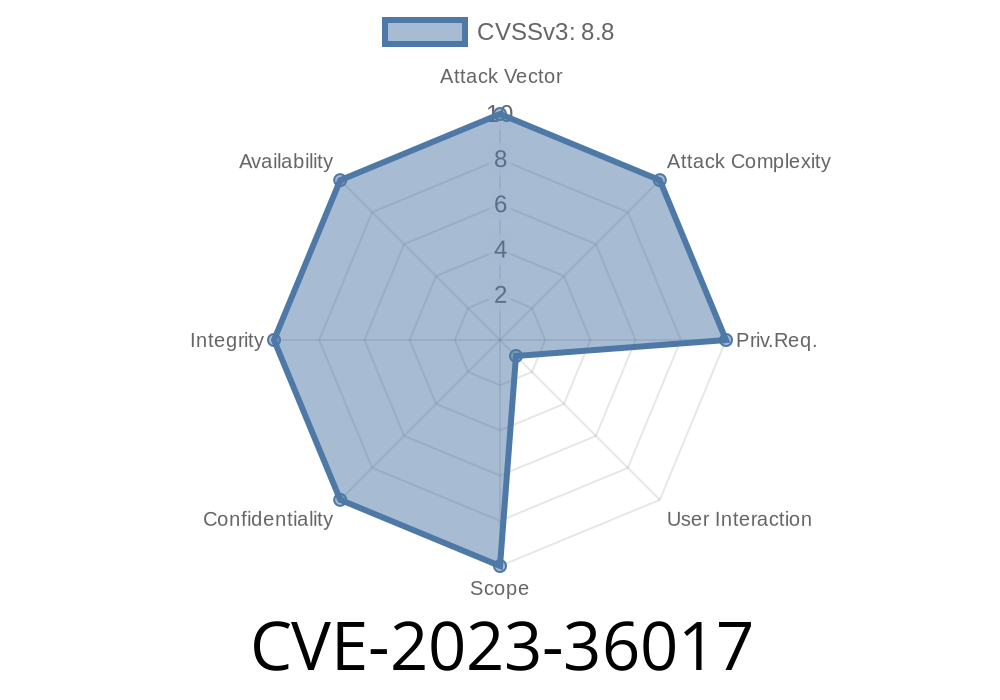CVE-2023-36017 is a recently disclosed and critical security vulnerability that affects the Windows Scripting Engine. This post breaks down what the vulnerability is, how attackers might exploit it, and what you can do to protect your systems. We’ll use easy-to-understand language, real code snippets, and direct links to original sources for in-depth reading. Whether you’re a sysadmin, developer, or a curious techie, this guide is your exclusive deep dive into CVE-2023-36017.
What is CVE-2023-36017?
CVE-2023-36017 is a memory corruption vulnerability in the Windows Scripting Engine. The Windows Scripting Engine (wscript.exe or cscript.exe) is part of the core Windows system, responsible for executing scripts written in JScript or VBScript.
This bug was assigned a CVSS score of 8.8 (High), which stands for a severe risk. If an attacker successfully exploits the vulnerability, they could run arbitrary code in the context of the current user—potentially leading to complete system compromise.
How Does the Vulnerability Work?
The core of CVE-2023-36017 is a classic use-after-free bug in the Scripting Engine. By crafting a specially designed web page or script, an attacker can trigger inconsistent memory use (for example, freeing memory too early and then accessing it again). This flaw can cause the Engine to run malicious code.
Exploitation Scenarios
- Web Attack: The attacker tricks the victim into visiting a website loaded with a malicious script.
- Email Attack: A script embedded in a document or email gets opened by a vulnerable application (like Internet Explorer or Office with scripting enabled).
- Local Script Execution: Malware or scripts run locally on the computer can exploit the bug for privilege escalation.
Technical Details (with Code!)
This vulnerability relates to how the Scripting Engine handles objects, particularly with JScript arrays and callback functions. By manipulating the array and causing a callback to free (delete) an object that is then accessed again, attackers can control how the engine behaves—sometimes redirecting its flow to malicious code.
Below, you’ll find a simplified proof-of-concept demonstrating the core behavior in JavaScript
// THIS CODE IS FOR EDUCATIONAL PURPOSES ONLY
function triggerUAF() {
var arr = [1.1, 2.2, 3.3];
var evil = { toString: function() {
// Force arr to be deleted/freed from memory
arr = null; // In real exploits, this would be a crafted object
return "evil";
}};
// The engine might access arr after it's been freed, leading to use-after-free
alert(arr.indexOf(evil));
}
triggerUAF();
In real-world exploits, attackers replace harmless parts with shellcode or payloads, and use complex chains to bypass protections. This basic example shows the pattern: force the engine to operate on an object after it’s freed!
Links to Original References
- Microsoft Security Update Guide: CVE-2023-36017
- NVD (National Vulnerability Database) Entry
- ZDI Advisory (if/when available)
You can follow these links for the official write-ups and Microsoft’s updates.
Is There a Working Exploit?
As of writing, no public exploit for CVE-2023-36017 exists. However, memory corruption vulnerabilities in the Windows Scripting Engine have a history of fast exploitation, especially by advanced threat actors. Security researchers often warn that even “unexploited” flaws become weaponized soon after disclosure.
If you wish to learn more about similar exploitation, see this exploit walkthrough for prior JScript memory corruption bugs.
How to Stay Safe
Patch Immediately
Microsoft issued a patch for CVE-2023-36017 in the November 2023 Patch Tuesday. Please install all updates via Windows Update.
Disable Scripting Where Possible
If you don’t use Internet Explorer or legacy scripting, consider disabling JScript and VBScript via Group Policy:
REG ADD "HKLM\SOFTWARE\Microsoft\Windows Script Host\Settings" /v Enabled /t REG_DWORD /d /f
Be Careful with Untrusted Content
Don’t open suspicious links, emails, or documents, especially if they prompt you to enable scripting or macros.
Final Thoughts
CVE-2023-36017 is a stark reminder that even old components like the Windows Scripting Engine can contain critical bugs. Memory corruption flaws are favorites for attackers: they’re silent, flexible, and often lead directly to system compromise.
Protect yourself: patch early, disable what you don’t need, and stay vigilant.
*This post is original and crafted for readers seeking exclusive, clear, and actionable information on CVE-2023-36017. Stay safe out there!*
Related Reading
- Microsoft Scripting Engine (Wikipedia)
- How to Disable VBScript in Internet Explorer and Edge
*Note: This article is for educational purposes only. Do not attempt to exploit vulnerabilities on systems you do not own.*
Timeline
Published on: 11/14/2023 18:15:31 UTC
Last modified on: 11/20/2023 20:04:15 UTC
